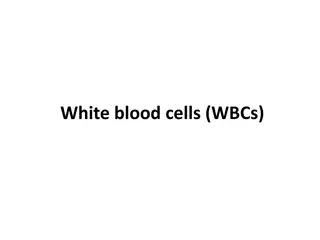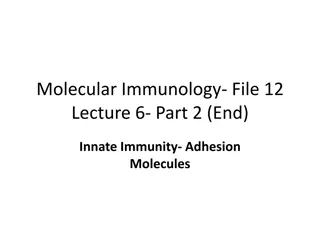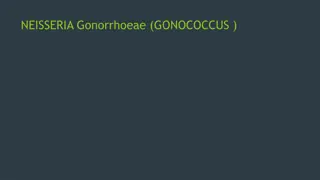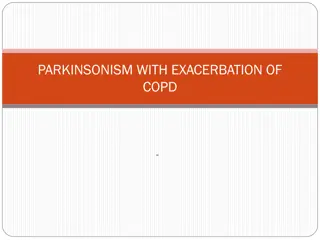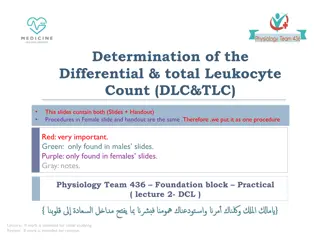Differential white blood cell count
Differential white blood cell count, also known as a leukocyte count, is a crucial test to determine the different types of white blood cells present in the blood. The cells are classified into granulocytes (neutrophils, eosinophils, basophils) and agranulocytes (lymphocytes, monocytes). Blood smear
3 views • 21 slides
Understanding White Blood Cells: Defense Mechanisms and Functions
White blood cells, specifically neutrophils and macrophages, play crucial roles in defending the body against infections. Neutrophils attack and destroy bacteria in the blood while macrophages, once matured in tissues, combat intratissue disease agents. These cells exhibit unique abilities such as d
7 views • 52 slides
Understanding White Blood Cells and Their Classification
White blood cells (WBCs), or leukocytes, are vital elements of the blood responsible for protecting the body against invading organisms. They are classified into granulocytes (neutrophils, eosinophils, basophils) and agranulocytes (monocytes, lymphocytes), each playing specific roles in the immune s
1 views • 28 slides
Understanding the Genus Neisseria: Pathogens and Characteristics
The genus Neisseria comprises important pathogens such as Neisseria meningitidis and Neisseria gonorrhoeae, causing meningitis, gonorrhea, and other infections. This article explores their characteristics, differentiation from non-pathogenic species, properties like Gram-negative diplococci, and ser
0 views • 32 slides
Role of Adhesion Molecules in Immune Response to SARS-CoV-2 Engagement
Engagement of SARS-CoV-2 triggers the complement system and TLR 7 in neutrophils and macrophages, leading to the release of inflammatory cytokines and chemotactic factors. This results in the upregulation of adhesion molecules on blood capillary endothelial cells and leukocytes, facilitating leukocy
3 views • 12 slides
Understanding the Importance of the Immune System for Homeostasis
Explore the intricate workings of the immune system, from its component parts and defense mechanisms to the significance of homeostasis maintenance. Discover how non-specific and specific immune responses, phagocytosis, neutrophils, natural killer cells, and interferons play vital roles in protectin
0 views • 32 slides
Understanding Hematopoiesis and White Blood Cells in Blood Formation Process
The process of hematopoiesis involves the lifelong production, multiplication, and specialization of different blood cells in the bone marrow, starting with the stem cells. This process includes the differentiation and proliferation of various progenitor cells, regulated by hematopoietic growth fact
0 views • 27 slides
Understanding Phagocytosis, Inflammation, and Granulomas in Tuberculosis
Phagocytosis is a crucial process where cells engulf and digest pathogens. Inflammation responses involve various immune cells like neutrophils, plasma cells, lymphocytes, and macrophages. Granulomas, typical in diseases like tuberculosis, are mass accumulations in chronic inflammation. Tuberculosis
0 views • 18 slides
Clinical Manifestations and Complications of Neisseria Gonorrhoeae Infection
Neisseria gonorrhoeae, also known as gonococcus, is a bacterial pathogen responsible for gonorrhea. The virulence factors of N. gonorrhoeae include pili/fimbriae for adhesion, outer membrane proteins like Porin for protection, opacity-associated protein for adhesion to neutrophils, and more. Clinica
0 views • 15 slides
Understanding Parkinsonism Complicated by COPD Exacerbation in an Elderly Patient
A 76-year-old male with a history of COPD and Parkinsonism presents with breathlessness, cough, and thick white sputum. Laboratory findings show increased TLC, ESR, and Neutrophils. The chest X-ray reveals mild pleural effusion. Smoking is highlighted as a possible cause of COPD exacerbation. The pa
0 views • 12 slides
Understanding the Inflammatory Response Mechanism
The inflammatory response is a crucial defense mechanism of the immune system. It comprises three lines of defense aimed at protecting the body from harmful pathogens. When a barrier is breached, such as by a splinter carrying bacteria, the inflammatory process is initiated. This includes the releas
0 views • 25 slides
Understanding Differential and Total Leukocyte Count (DLC & TLC)
Differential and Total Leukocyte Count (DLC & TLC) is a crucial test that determines the percentage of different types of white blood cells in the total leukocyte population, aiding in diagnosing various disease processes. The test involves identifying and counting different types of white blood cel
0 views • 18 slides


